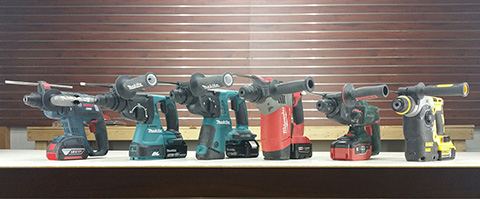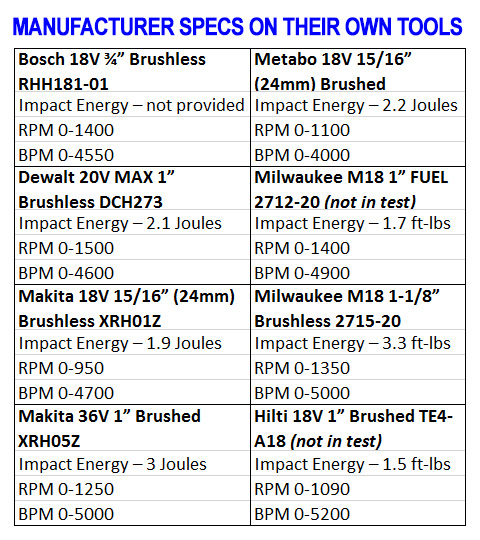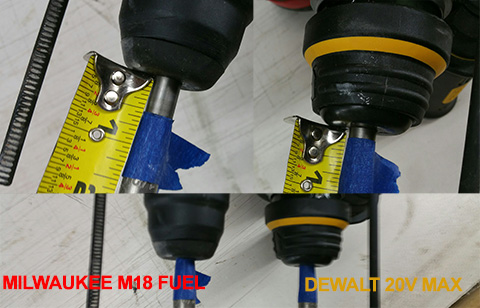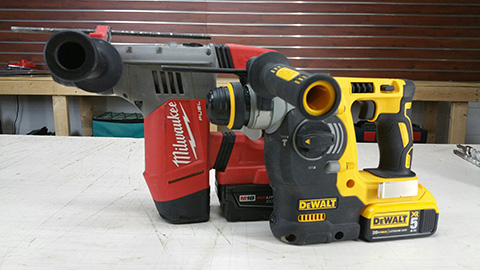As cordless tools become more powerful with longer life batteries and price continues to come down (especially when you’re already invested in batteries) there are several tools that really start to make more sense in cordless. Not sure the difference between Hammer Drill & SDS-Plus Hammer Drill? The cordless SDS-Plus rotary hammer is quickly becoming one of those tools that really compliments a cordless platform.
SDS-Plus applications are much wider in scope so it’s tougher to judge a winner or even a clear goal but our hope is this will help you as a tool when you are selecting your next SDS-Plus Rotary Hammer. The contestants listed as bare tools, Bosch ¾” RHH181BN ($279), Dewalt 1” DCH273B ($329), Makita 18V 15/16” XRH01Z ($289), Makita 36V 1” XRH05Z ($359), Metabo 15/16” KHA18LTX ($313), Milwaukee 1-1/8” 2715-20 ($349)
*** Added 11/27/2015 Results from Hilti 18V TE 4-A18 SDS-Plus 18V Cordless
We recently did a couple similar head to heads with 18v cordless Grinders – Recip Saws – Hammer Drills where the objective was a little clearer, all trying to accomplish basically the same thing. Fair warning this comparison test is less precise than standard hammer drill test because concrete as a testing medium in less consistent that metal or even 2×4 lumber. With chunks of aggregate blended to make concrete, a bit can easily hang up for a few seconds at any point skewing the data. The hope being this balances out so take these numbers as you will. We took a look at several tests for light duty and heavy duty applications to really gauge these tools across the full spectrum, using a fully charged 5.0Ah (5.5Ah Metabo) batteries as a fuel tank.
The below chart shows exactly what various manufacturer specs for 6 units in test with addition of Milwaukee 1″ FUEL 2712-20 and the Hitli 1″ SDS-Plus TE4-A18 for some other popular professional model comparisons. The Impact Energy below is exactly as they report it (we did not convert) however according to Google 1 Joule of energy = .73756 ft-lbs. so converting those SKUs reported in Ft-lbs would look like: Milwaukee 2712-20 (2.30 Joules), Milwaukee 2715-20 (4.47 Joules) & Hilti TE4-A18 (2.03 Joules)
COMPARISON TESTING:
For this test we choose each brands largest 18V rotary hammer but for the heavy duty applications a couple of these tools were really seem better equipped for the task and it’s pretty apparent from size and weight, Makita 36V at 10.3 lbs and Milwaukee M18 FUEL at 9.5 lbs. In the corded world of SDS-Plus rotary drills like the Bosch Bulldog ($199) and Bosch Bulldog Xtreme ($259) have been the staple forever years constantly getting more powerful. Only recently have we seem smaller rotary drills deliberately less powerful, to shave off size and weight. WEIGHT: Bosch 6.0 lbs, Dewalt 7.15 lbs, Makita 18V 7.35 lbs, Makita 36V 10.3 lbs, Metabo 7.5 lbs, Milwaukee 9.5 lbs
In the heavy duty application we timed a 1” bit drilling down 5” x3 holes (15” of total drilling) which might not seem like a lot but if you’re doing the drilling it’s not fun. This is at or above most of these tools capacities so it really gives a good idea of their upper limits. The Bosch, only rated for 3/4” got one hole in at 1:37 however on hole 2 really struggled so we pulled it from this test. The rest seemed to complete the task without problems, here are the results. POWER/SPEED: Bosch N/A, Dewalt 4:07, Makita 18V 4:17, Makita 36V 3:21, Metabo 3:47, Milwaukee 2:17
The Milwaukee M18 FUEL really shinned in this competition which was not a surprise as it is the highest rated at 1-1/8”, Milwaukee also makes a 1” 2712-20 $299 which might line up better with the other 1” units. In use what actually made this unit the favorite among our team was actually vibration control, easy to see with the 2 large dampeners on the handle. For large hole drilling and definitely for any chipping this would be the way to go.
In the light duty speed test we were half tempted to throw these numbers out all together because of how close they were, we did 5x holes with ½” bit only 2” depth. All 5 of these tools really zipped through with ease, we had to go to video data to really get see which won. LIGHT DUTY SPEED: Bosch :41, Dewalt :28, Makita 18V :38, Makita 36V :28, Metabo :32, Milwaukee :25
We got some interesting data when we went to the battery life test, to run the batteries out we used the same ½” Bosch Full Carbide Bits from the speed test but went to 3” depth to try to run the batteries out faster. We did not recharge the batteries at any point and we let all the other Coptool team take turns with each unit for hands-on experience. Battery Life Total Holes: Bosch 24, Dewalt 42, Makita (18V) 27, Makita (36V) 66 total (33/battery), Metabo 34, Milwaukee 33
The Dewalt just keep going, it was not the fastest out of the gate but steadily kept drilling holes on the single battery charge. We were interested to get a better understanding of how these different tools behaved beyond just shear motor size. One other possible factor that seemed to correlate with some of our other data pretty closely was stroke length (or actual travel length of the SDS-Plus bits). As you might guess the bigger rotary hammers had longer travel and the new Dewalt came in as the shortest. The combination of motor and stroke are going to create the force but of course more travel in stroke more battery you are going to drain.
While the Dewalt was the shortest stroke length it still seem to have enough power to get through 1” solid holes, with the lower weight this tool is actually well suited for many users who might consider a compact SDS-Plus because they mostly do anchoring with ¼”, 3/8” & ½” drilling. The biggest issue most people have with compact SDS-Plus drills is they occasionally need to do a larger 1” hole or even a 2” or 3” core. The Dewalt is the most recently launched rotary hammer in the comparison so it makes a lot of sense for them to go after the new growing compact SDS-Plus tool users but address that occasional heavy duty need. For those looking for a traditional 1″ rotary hammer this may not be your best option.
Overall Performance
Picking a winner for this test isn’t as straightforward as in the past comparisons however since the goal hear was looking for the most powerful cordless SDS-Plus we would have to say the Milwaukee M18 FUEL takes home that trophy. When we revisit the cordless SDS-Plus market for future testing we will definitely look to break the testing into 2 different comparisons of heavy duty SDS-Plus where we might core drill 4” holes and chip apart solid concrete as well as compact SDS-Plus where we predrill tapcons and set drop-in anchors. Both certainly have many professional applications.
In the meantime if you have any questions on Cordless SDS-Plus Rotary Hammers and which one might be best for your application give the folks at Ohio Power Tool 800-242-4424 a call and they will be more than happy to help you find the right tool for the job.
**** Coptool testing disclaimer ****
We are not a testing laboratory, we are not considering long term performance and while we try very hard to remove user error there are many variable (accessories, people, materials, etc) that affect each tests outcome. We deliberately do several test on the same battery to average high and low load performance for what we consider better real world conditions. Our findings are just our personal thoughts and opinions and do not represent any recommendations on products.



